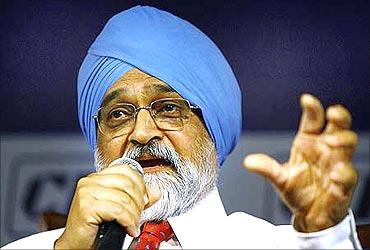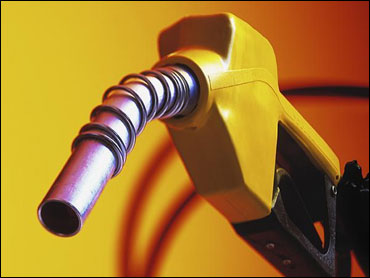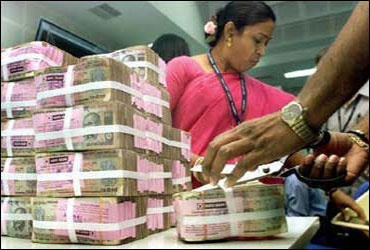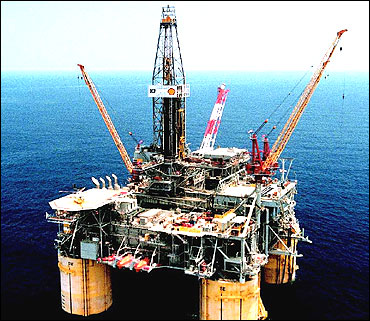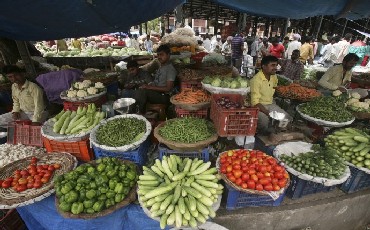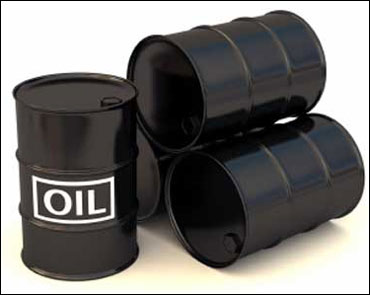 | « Back to article | Print this article |
Fuel price hike will help curb inflation: Montek
Defending the government's decision to raise prices of petroleum products, the Plan panel said on Wednesday it would suck money from the system and ease inflationary pressure in the long run.
"As we are raising the prices, that will pull money away from the system. That would have a softening impact (on inflation)," Deputy Chairman Planning Commission Montek Singh Ahluwalia told reporters.
He further said, "I don't agree with the view that if we had done nothing, inflation would have been lower. If we had done nothing, then the hidden inflation would have been eating away."
Click NEXT to read further. . .
Fuel price hike will help curb inflation: Montek
The decision to cut duty, he said, "was a conscious decision to lose some revenue to moderate the impact (of the fuel price hike on the common man)".
The government had last week hiked diesel, kerosene and cooking gas prices by Rs 3 per litre, Rs 2 per litre and Rs 50 per cylinder, respectively.
In addition, the government also reduced customs duty on petroleum products to 2.5 per cent from 7.5 per cent, which would result in an annual revenue loss of Rs 49,000 crore (Rs 490 billion).
Excise duty on diesel was also reduced from Rs 4.6 per litre to Rs 2 per litre.
Click NEXT to read further. . .
Fuel price hike will help curb inflation: Montek
During the remaining nine months of the fiscal, the Centre and states will lose around Rs 24,000 crore (Rs 240 billion) and Rs 11,000 crore (Rs 110 billion), respectively, due to the duty cut on petroleum products.
The Plan panel chief said the rise in prices of fuel items would suck liquidity from the system, leading to a moderation in inflation numbers.
Headline inflation, as measured in terms of the Wholesale Price Index, stood at 9.06 per cent in May and experts said it will breach the double-digit mark by July on account of the fuel price rise.
Click NEXT to read further. . .
Fuel price hike will help curb inflation: Montek
Regarding the impact of the fuel price hike on the fiscal deficit, Ahluwalia said: "They (government) have quantified some revenue losses.
"What happens to the fiscal deficit depends on many other things. I am sure the Finance Ministry is looking at that. And I think they are shortly going to submit to Parliament some sort of medium assessment on the fiscal position."
He further said, "My personal view is that if we are looking ahead and if India faces a situation of rising energy prices, we should adjust ourselves to passing on the fuel prices, because if we have fail to do so, we will be weakening the economy."
Click NEXT to read further. . .
Fuel price hike will help curb inflation: Montek
Asked his views about when the inflation numbers are likely to moderate, he refused to make any guess.
"The Finance Ministry has said that if the monsoon is normal and agricultural production is good, then price pressure will decrease. But I do not want to give a forecast," the Plan panel chief said.
Ahluwalia also called for a drastic reappraisal of the subsidy system in the country.
"We in the Planning Commission. . . it is our view that except for strictly targeted subsidies, I don't think we can afford a system where we have subsidisation of fuel in any extensive way.
"The increase in prices has been a very modest increase.
"It has not covered the full gap necessary. So if we have to implement the kind of energy policy that makes sense in the medium term, we have to somehow or the other pass on the fullburden unless oil prices fall," he said.
Click NEXT to read further. . .
Fuel price hike will help curb inflation: Montek
Regarding the draft Food Security Bill, the Plan panel chief said: "The Department of Food and Civil Supplies is supposed to bring its proposals before the GoM. . . I know they are working on it."
Asked if the Bill is likely to be implemented this fiscal, he refused to commit on a timeframe.
"As far as Food Security Act is concerned, the Act also depends on the new poverty numbers.
"So whether you pass it now or you pass it a little later, I don't think the poverty list is going to be available for some time.
"So I don't think the date of passage is crucial. What is important is so get a clear idea of what is it going to be," he said.
